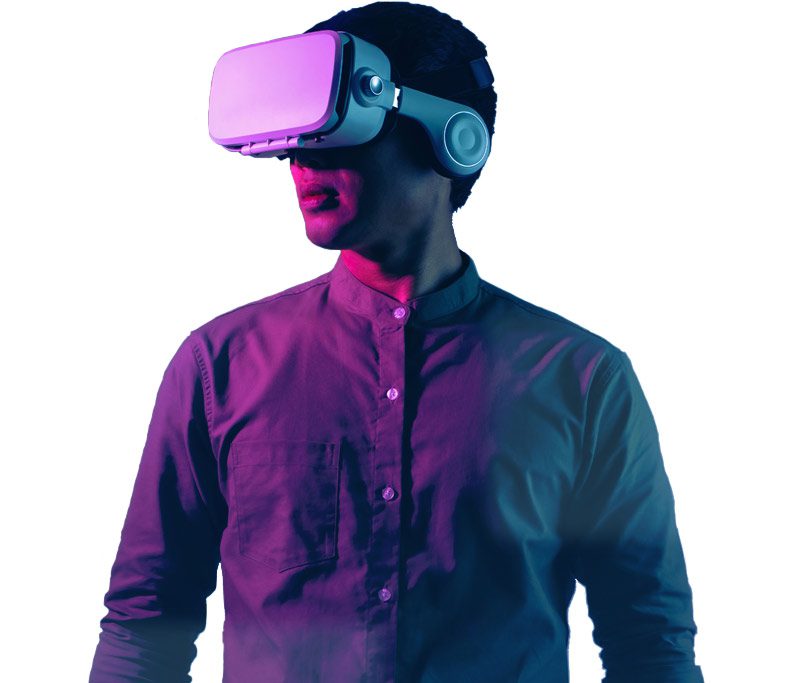The future of tech and CX
We’re at a point in time where technology is interwoven into almost every facet of our existence. Think about it: from the moment you woke up this morning to now, as you’re reading this blog (on your tech device of choice), you’ve probably relied on multiple technologies to guide you through your daily tasks.
Considering this, you’d probably agree that the integration of tech into our routines has become more than a mere convenience — it’s an expectation. This expectation is critical for your brand to consider as the future unfolds, and Web3, AI, immersive experiences and blockchain technology slowly become the new norms.
In collaboration with our friends at ITAK, our Web3 partner, and Ledger, a leader in Web3, we created a whitepaper to separate fact from hype about what the new age of CX looks like and the thought-provoking potential of Web3 as a tool.

But let’s start with the big question…what is Web3, anyway?
What is Web3?
Per ITAK, Web3 “represents the next generation of the internet, focusing on decentralized, peer-to-peer interactions and data interoperability. Also known as the semantic web or the decentralized web, Web3 emphasizes reducing central control and enabling distributed collaboration and decision-making.”
The internet we currently know is Web2, which mainly consists of browsing websites, using social media and accessing online services. Web3 takes things up a notch by adding decentralization and user empowerment. This means the power isn’t just in the hands of big companies or centralized authorities — people will have the ability to own and control their own data, identity and digital assets. The goal is to have a more open, secure and transparent online environment.
Immersive experiences in the Web3 customer journey
Web3 has great potential to enhance immersive experiences like VR and AR, which, in turn, will make communication between brands and customers fun, engaging and convenient. Web3 allows for the creation of decentralized virtual worlds and platforms, and empowers the concept of the metaverse — the fully interactive and immersive internet.
For brands, this means VR and AR can allow for the convergence of two experiences into one: the convenience of online shopping and the immersive nature of physical shopping. Some examples of what this might look like include:
Virtual showrooms
Brands can create virtual showrooms where customers can explore their products in a lifelike 3D environment. For example, customers can go into a virtual buying experience at a luxury store and test expensive watches, clothing and handbags before making the purchase. This could also apply to taking a virtual tour of apartments and hotels. The ability to try things on and tour physical spaces for the comfort of your sofa enhances customer satisfaction and reduces the need for physical stores.
Gamified experiences
Brands can also incorporate gamification into their web experiences to make them more engaging. For example, users can earn rewards or tokens by completing certain tasks or challenges related to the brand. This not only keeps users entertained but also creates a sense of loyalty and incentivizes them to continue interacting with their brand.
Virtual events and experiences
In Web3, virtual events, conferences and exhibitions will become the norm, as customers can participate from all over the world. Included in the events could be virtual networking, live Q&A or even VR experiences where brands can expand their reach of global audiences and create buzz around products and services.
Personalized and customizable experiences
Brands can use customer data to offer tailored recommendations, personalized avatars or even virtual experiences that align with the customers’ interests. This level of personalization enhances customer engagement and creates a deeper connection with the brand and the customer.
Social virtual spaces
Virtual spaces can be used for customer support, product demonstrations or community building. This provides a unique opportunity for brands to have a more authentic and direct conversation with their customers, fostering loyalty and brand advocacy.
How your brand can adopt a modernized CX in Web3
1. Understand customer pain points.
Understanding customer needs is critical prior to onboarding new tech. Where are areas of improvement in the current customer journey, and where can immersive experiences add value? For example, if customers struggle to understand complex products or services, a 3D interactive guide or virtual tutorial could be the solution to a more intuitive learning experience.
2. Focus on personalized, AI-driven experiences.
Brands can use AI to personalize immersive experiences in real time, with virtual assistants and avatars. Progress in AI enables the use of predictive and prescriptive data to analyze conversations, emotions intent, language, etc., to provide personalized products and services that match individual customer needs. For example, AI can predict a customer’s purpose for reaching out and try to solve their challenges.
3. Think outside the box.
Web3 offers so much opportunity for brands to tailor experiences to the customer and think outside the box with AI-powered virtual assistants, customizable avatars, gamification, smart contracts and NFTs. For example, NFTs can be used to represent unique digital assets that customers can own and customize within an immersive experience.
4. Partner with and lean on CX experts.
Integrating new technology is a marathon, not a race. To adopt tech smoothly and safely, you need the help of experts who have a proven track record of successful tech integrations with multiple brands. Your CX experts can help you understand how best to serve your customers and your contact center with a healthy onboarding of new tech.
A successful modernized CX hinges on your brand’s adoption of tech
Web3 technologies are opening opportunities to build truly innovative, superior customer experiences. Embracing this transformation and thinking outside the box with how to use tech will delight your customers, help you reach new audiences and generations, and improve operational efficiencies within the contact center.
With this said, in collaboration with ITAK and Ledger, we’re thrilled to provide a whitepaper titled: “The new age for CX.” This whitepaper details eight market trends your brand needs to know and includes several case studies. To learn more about emerging technologies in Web3 and how your brand can harness them to achieve a superior CX, make sure to check it out.
